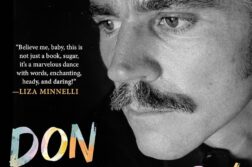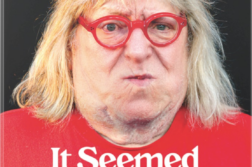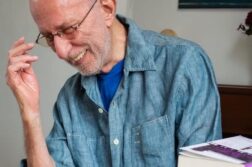THIS BEING the 100th anniversary of Tennessee Williams’ birth, Moisés Kaufman has created a reframed, meta-theatrical version of Williams’ short story “One Arm,” which was produced this summer at New York’s Acorn Theater by Kaufman and the Tectonic Theater Project (TTP). For Kaufman, bringing One Arm to the stage was a long labor of love involving numerous stagings and re-workings. The Tony Award-winning director, playwright, and co-founder (with Jeffrey LaHoste) of the TTP refers to himself as “the hardest-working Jewish Latino gay artist in New York.”
Justifiably, then, Kaufman has always related to “outsiders,” just as Tennessee Williams did. Williams wrote the story in 1945, published it in a collection of short stories in 1948, and converted it into a screenplay in 1967. However, despite passing interest by Marlon Brando, the script was never filmed. In the tale, a Navy boxing champ, Ollie Olsen, mutilated in a car accident, turns to hustling to survive, a desperate road that leads to death row. A press account described it as “an erotic fever dream of an American nightmare.”
Kaufman was born and raised in Caracas, Venezuela, by European Orthodox Jewish parents. His father was a Romanian Holocaust survivor who, at age eleven, in order to earn money for food, made yellow Stars of David that Jews were forced to wear. As a yeshiva student, Moisés was confused and anxious about his sexuality, hiding it from his own community. Although he studied business administration at the Metropolitan University in Caracas with the expectation of following his father into the food wholesale business, he was already hooked on stagecraft, to which he was exposed while attending an international theatre festival in Caracas at age fourteen. In his native Venezuela, he performed as an actor with the Thespis Theater Ensemble, one of the country’s foremost experimental companies.
His artistic journey brought him to New York in 1987, where he helped to organize the Tectonic Theater Project four years later. His first play, Gross Indecency: The Three Trials of Oscar Wilde (1997), which was based on court transcripts, letters, and contemporary newspaper clippings from the 1890’s, opened to broad critical acclaim.
A month after the murder of Matthew Shepard near Laramie, Wyoming, on October 6, 1998, Kaufman and ten company members traveled there and conducted interviews with residents of the town, which was traumatized by the crime and its aftermath. From these interviews they wrote the play The Laramie Project, which has been widely performed across the country, especially in high schools and colleges, ever since. Later made into a film for HBO, this “Our Town for the new millennium” reached a still larger audience.
Tennessee Williams often reworked material from his short stories for the stage. A case in point is his “Portrait of a Girl in Glass,” which he expanded into the 1944 break-out drama The Glass Menagerie. Kaufman was fascinated by the fact that “One Arm,” based on an amputee hustler that Williams met in New Orleans, lingered with the writer for so many decades. Like the screenplay, Kaufman’s minimalist staging relies on the audience’s willingness to suspend disbelief. The eight cast members play multiple parts, including sailors, hustlers, medical students, and chaplains.
Kaufman, who lives on Manhattan’s upper West side with Jeffrey LaHoste, his artistic collaborator and life partner of over twenty years, took time out from tweaking preview performances of One Arm to speak with me.
Michael Ehrhardt: You attended business college in Caracas; what was the epiphany that made you decide to chuck it all and become involved in the theater?
Moisés Kaufman: Well, it was about the time I was taking a course in accounting. If you’ve ever done that, you’d know how boring a business course can be. I decided what I had to do what was in my heart, which was working and directing in the theater and in film.
ME: I know Peter Brook was a big inspiration for you. Do you recall what production, and who else do you count among your
inspirations?
MK: I was very fortunate because we had the Caracas International Theater Festival, one of the most important in the world. So I grew up seeing the work of Peter Brook, Tadeusz Kantor, Jerzy Grotowski, or Pina Bausch. That’s what inspired me to work in the theater.
ME: Growing up gay in an Orthodox Jewish environment must have been difficult. At what point did you decide to follow your bliss into theater? How did your family react?
MK: They didn’t like it at all; I knew that I couldn’t be gay in Venezuela. So, I made up my mind to come to New York and study theater at NYU’s Experimental Theater Wing. I left NYU early because I felt I had learned everything I needed to know and wanted to start my own theatrical company as soon as I was able to.
ME: You were approached by movie
studios to make a film version of Gross Indecency, but it didn’t pan out. What happened?
MK: Well, I was initially interested in doing the film, but then another film on Wilde was produced [1997’s Wilde, starring Stephen Fry], and that put an end to the possibility of doing mine.
ME: Would you consider Wilde’s Salome a forerunner of experimental theater?
MK: Yes, definitely. It still seems very experimental. I’ve always thought of Wilde as a forerunner of performance art. He lived his art.
ME: You’ve directed Wilde’s Lady Windermere’s Fan at the Williamstown Theater Festival and Macbeth in Central Park. Do you approach more traditional plays differently than your TTP work?
MK: Not really. Whether it’s the Scottish play or Wilde or Sondheim, I approach them all the same way. It’s always the theatricality of the piece that’s the most important thing. I have always been obsessed with theatrical thinking that encourages us to profoundly re-imagine what happens on the stage; to use the audience’s imagination to help us construct the event.
ME: Speaking of Sondheim, you’ve directed his Into the Woods [for the Kansas City Rep]. What attracted you to it?
MK: I think Sondheim is one of the great minds of American theatre. Into the Woods is about the importance of fables, which serve a very primal purpose in our life. They have such ancient power, and they’re tales that teach us about ourselves.
ME: In light of our current political and cultural climate, do you believe The Laramie Project altered the thinking of viewers who were not already accepting of gay people?
MK: I’d like to think it has. The play is still frequently performed all around the states. A lot of high schools still do it. And, if President Obama has formed a task force to end bullying and harassment of gay youth, it’s a sign of big progress.
ME: I know you’re active in the “It Gets Better” campaign. Could you expand on that?
MK: Gay teenagers need out role models to give them confidence. “It Gets Better” is a public media campaign to show gay youth that they can survive the homophobia and bullying they may be experiencing, and things will get better once they’re out of the small-minded communities they grew up in. I was told in a hundred different ways that being a homosexual was the worst possible thing you could be. But you can move on and be who you are, and be proud of it.
ME: Is it true that you wore a little black dress to help playwright Doug Wright overcome writer’s block, when he was working on I Am My Own Wife?
MK: Where did you find that out? Yes, that’s true. I used this theatre technique in which we bring in a theatrical object, a prop, a costume, to create a moment with the material. And I came in a dress to help Doug get over his block. You always have to help convince the writer that you believe one hundred percent in his work. Wearing the black dress was my way of demonstrating that.
ME: You’ve stated that your play, 33 Variations, about a dying woman musicologist’s obsession with Beethoven, is your most personal work. How so?
MK: Well, the character was someone in search of inspiration, a human being on a quest. I think there’s something I related
to about that hunger. I wanted to explore
the idea of obsession giving meaning to your life.
ME: Now, let’s get down to One Arm. How did you come across Williams’ screenplay for the story, and what motivated you to adapt it for the stage?
MK: I always thought that this piece is his frankest look at a certain kind of homosexual world. And the fact that he wanted to make a movie version of it, and never abandoned it, always fascinated me. Williams’ homosexuality was always in the background in his previous work—like Brick in Cat on a Hot Tin Roof. But One Arm was more open, and he obviously wanted to get it out there.
ME: Williams uses mutilation as a literal focus in One Arm, but he also wrote a one-act play titled “The Mutilated.” Is there a pattern?
MK: I think he was concerned with people who were very beautiful and were damaged. He wrote that this movie was about “the prevalence of mutilations among us all, and their possible transcendence.” Somebody says to this one-armed hustler who looks like a statue of Apollo, “It makes you more beautiful.” I think it’s a metaphor for the artist; Williams thought of himself that way. He makes such beautiful things, but he is so damaged.
ME: I liked the coup de théâtre at the end of One Arm. Is the supernatural ending also in the screenplay, or did you devise it?
MK: That was my invention. As was the quote, which is from the short story, when the Narrator says, “But death has never been much in the way of completion.”
ME: People never go out of their way to say that Arthur Miller or Eugene O’Neill was a heterosexual playwright, but Williams can never escape the label of “gay playwright.” How do you react to that?
MK: Well, I profoundly resent those labels. I am Venezuelan, I am Jewish, I am gay, I am a writer and director living in New York City, and I reflect all of my cultures. My plays are about me being an artist living in the 21st century. I am a writer whose experience of the world has been formed by all of my experiences in it. I am the sum of those parts and more.
ME: Do you buy the notion that Williams was clinically depressed during his last twenty years, causing a downward spiral in his creative output?
MK: To some degree. But I also think it was his disappointment with the way his later work was received at the time. This work was more and more experimental—well ahead of its time. He was very much influenced by Samuel Beckett and especially Jean Genet. He was also inspired by García Lorca and perhaps by Edward Albee. But he didn’t find the right directors for his experimental work. Elia Kazan helped him a lot with Streetcar and with the more the naturalistic plays, but he wasn’t helpful when it came to Camino Real, which was brilliant but difficult, and hardly naturalistic.
ME: You’ve listed “Pixar” as “my religion” on Facebook? Is that irony?
MK: Yes. That’s my comment on organized religion today.
ME: What is your next project?
MK: To go on a long vacation.
Michael Ehrhardt is a freelance writer based in New York City.




